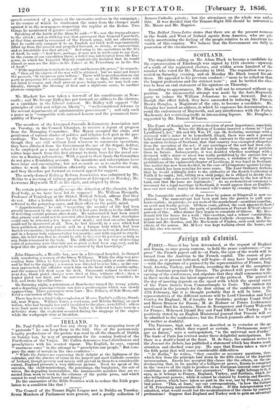SCOTLAND.
The requisition calling on Mr. Adam Black to become a candidate for the representation of Edinburgh was signed by 1124 electors—upwards of a sixth of the registered electors, and within seven hundred of the number who voted for Mr. Macaulay in 1852. The requisition was pre- sented on Saturday evening, and on Monday Mr. Black issued his ad- dress, He appealed to his previous conduct—" more to be relied on than the largest professions and the stietest tests " ; and he invited the elec- tors to hear an oral statement of his opinions on 'Thursday.
According to appearances, Mr. Black will not be returned without op- position. An unsuccessful attempt was made by the Anti-Maynooth party to induce Sir William Johnstone to come forward. But al- though this effort failed, they have succeeded in inducing Mr. Francis Brown Douglas, a Magistrate of the city, to become a candidate. Mr. Douglas has issued an address, in which he expresses his determination to resist the endowment of Maynoth, and any interference with the Forbes Mackenzie Act restricting traffic in intoxicating liquors. Mr. Douglas is supported by Mr. Duncan M`Laren.
The Court of Session has given a decision of great importance, especially to English people. When the Bishop of London inserted a clause in "Lord Lyndhurst's Act," 5th and 6th Win. IV. cap. 54, declaring marriage with it deceased wife's sister to be henceforth illegal, there was such a general belief that marriages of the kind were both contrary to the ancient law amid the modem feelings of Scotland, that that country was exempted altogether from the operation of the act : if any marriages of the sort had been cele- brated in Scotland, the new law did hot. legalize them, nor did it prohibit them in future. Subsequently, it was doubted whether marriage with a deceased wife's sister or niece was really prohibited by the antiont law of Scotland—unless the marriage was incestuous a violation of the express prohibitions of the eighteenth chapter of Leviticus, it was legal in Scotland. The matter has now been decided, in the case of Livingetoee against Living- stone, which has .been pending for some years. The Lord Ordinary declares that he would willingly defer to the authority of the Scotch Confession' of Faith if he could ; but, sitting-us-a- -eitiLjudge, he is obliged to decide that " raarrisge with a deceased wife'e sister is not incestuous by the law of Scot- land, and that the issue are legitimate." As no ecclesiastical ceremony ie necessary for a legal marriage in Scotland, it would appear than an English- man can now easily marry his deceased wife's sister by crossing the border.
The lamentable sacrifice of three lives by poiami at Dingwall is now ex- plained. The man-servant had been sent into the garden to pull some horse-radish ; in mistake lie got roots of the menkshood—aconitinu napellue, an acrid and, deadly poison. Of these roots, melted, the cook 4pearsto have/ made sauce ft r roast beef; the party of gentlemen at Provost Itl'Iver's house partook of this. After dinner they began to complain of illness. Mr. Mac- donald left the house for a walk : this exertion, and a robust constitution, appear to have saved him. The two Roman Catholic clergymen Mr. Mac- kenzie and Mr- Gordon, and Mr. Mackenzie of Findon, soon sank under the effects. of. the poison. Mr. M'Iver was kept walking about the house, and his life also was saved.










































 Previous page
Previous page